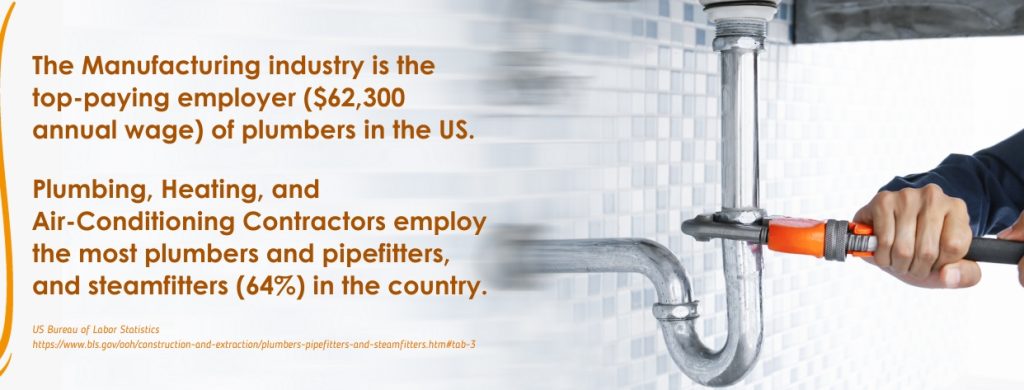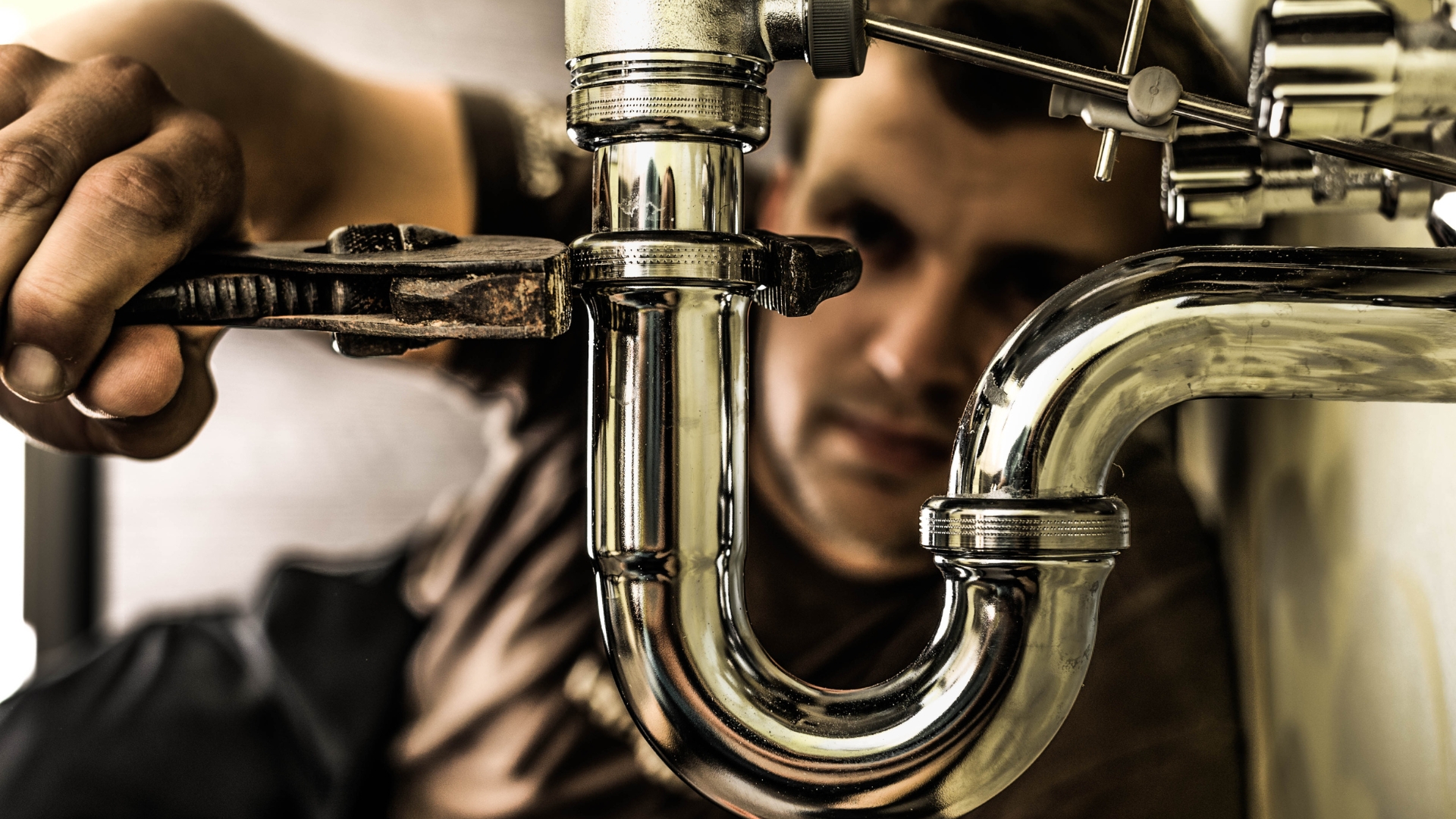Plumbers are trade professionals working with water fixtures, water heaters, piping systems, and the like. Plumbing schools usually require students to get their high school diploma to get started. Coursework includes courses that focus on the basics of working with pipes, plus an apprenticeship to understand the industry even more.
Different states have different requirements for their plumbers. Some even require both a practical and written exam to earn a certification.
Plumbing programs are completed toward a career diploma or an associate degree. A plumbing program is designed to help students prepare for full-time careers as plumbers and can be completed online.
Lessons are delivered via physical media like CDs, DVDs, or textbooks that are shipped to the student at the start of the program. Assignments are usually turned in through emails or forwarded via online education software.
What is a Plumber?
A plumber specializes in the repair, maintenance, and installation of plumbing systems. Plumbing systems consist of fixtures, pipes, and appliances that facilitate the distribution of gas, water, and waste systems in commercial, residential, and industrial settings.
Plumbers ensure that all these systems work properly and efficiently, allowing for effective drainage, clean water supply, and the overall safety and health of occupants.
Plumbers perform so many tasks, like installing and connecting plumbing fixtures, pipes, and appliances like toilets, sinks, water heaters, showers, and irrigation systems. These trade workers also read blueprints and building codes to create and execute plumbing installations.
Plumbers also evaluate and troubleshoot common plumbing issues like clogs, malfunctioning components, or leaks, using specialized techniques and tools to identify and repair problems.
The Labor Statistics Bureau says plumbers, steamfitters, and pipe fitters have a median annual wage of $60,090 as of May 2022.
Based on the BLS occupational outlook handbook, employment for these jobs is projected to increase to 2% from 2022-2023, just as quickly as the average for all other types of occupations. This translates to 42,600 openings for plumbers, steamfitters, and pipe fitters each year over the decade.
Methodology
This list of the best online plumber trade schools is based on several key factors. Online plumbing trade programs are offered by only a handful of trade schools and community colleges.
Prospective students must choose a school based on the program’s depth and the degree to which the trade school supports students’ hands-on learning. Other factors considered include:
- Instructional format: Online plumbing trade courses are designed for students to take asynchronously. Assignments are due via email or through the education software of the online trade school.
- Programs are designed to combine the fundamental skills, technical knowledge, and apprenticeship of plumbing based on recent international plumbing codes.
- Online learning promotes leadership, management, and interpersonal skills.
- May require an apprenticeship or experience to easily become a successful plumber and secure full-time employment.
- Professional instructors who are industry experts in the field of plumbing. Career guidance and student assistance to help students reach their career goals are provided.
- Most hold relevant accreditation from certifying bodies.
Top 5 Best Online Plumbing Trade Schools
Johnston County Community College

- Location: Smithfield, North Carolina
- Online Delivery Method: Online; Self Paced; In Person
- Time it takes to complete: 6 months
- Completion Rate: undisclosed
- Types of Aid: none
The plumbing training program is available online at Johnston County Community College. The continuing education program is an accredited program that will prepare students to become entry-level plumbers and land a rewarding career in plumbing.
This online program by JCCC helps students learn new skills and further hone the talents they use regularly. Some of the courses include:
- Cross Connection Control and Backflow Prevention Certification
- Cross Connection Control and Backflow Prevention Recertification
- Plumbing Exam Preparation.
This online plumbing program is handled by experienced plumbing instructors and plumbing professionals. The course materials are always up-to-date, the training programs are top-notch, and the instructors know industry trends.
This plumbing school offers training plans based on the student’s goals and experience. Regardless of the reason why students go for online plumbing training, JCCC ensures all students are given easy access to their numerous online courses, including its online plumbing courses.
Penn Foster

- Location: Scottsdale, Arizona
- Online Delivery Method: Online, Self Paced
- Time it takes to complete: 5 months (fast track); 9 months (average)
- Completion Rate: undisclosed
- Types of Aid: Military Benefits
For those who wish to have an in-demand plumbing career that allows them to use their troubleshooting skills, the online learning plumber program at Penn Foster is a wise option. Penn Foster’s Plumber Career Diploma prepares a student to become a plumber. Through this online course, prospective students will:
- Learn the basic skills necessary to become a licensed plumber, like reading blueprints, pipefitting, installing fixtures, and more.
- Prepare to become entry-level plumbers, plumbing technicians, steamfitter technicians, pipefitter technicians, and fire sprinkler installers.
This online plumbing course includes a modern plumbing introduction, how-to videos, and animations that allow recent graduates to use what they learn in real-world plumbing situations.
This program was originally offered by Ashworth College Central Network until it formally stopped accepting enrollments. Since then, the plumbing training program has been offered at Penn Foster, Ashworth College’s partner school.
Tyler Junior College

- Location: Tyler, Texas
- Online Delivery Method: Online
- Time it takes to complete: 12 months
- Completion Rate: undisclosed
- Types of Aid: undisclosed
The plumbing technician program offered by Tyler Junior College is dedicated to preparing students for the numerous career opportunities in the plumbing field. This online school for plumbers offers the best online courses that allow learners to gain entry-level skills needed to jumpstart a career in plumbing.
The main goal of this program is to prepare students to perform entry-level plumbing repair tasks and maintenance. This will also provide them with knowledge on safety issues and practices, use of critical safety information, personal protective equipment, and confined-space safety.
Students are also introduced to applicable math and plumbing tools, as well as plumbing drawings, interpretation, and application to layout and installation. They will also learn more about pipes and fittings, fixtures, and water systems. National certification is available for those who can complete this course, including OSHA 10-hour Certification.
SUNY Westchester Community College

- Location: Westchester County, New York
- Online Delivery Method: Online, Self Paced
- Time it takes to complete: 12 months
- Completion Rate: undisclosed
- Types of Aid: Military Tuition Assistance
If you search for plumber programs that handle the basics of plumbing, the Fundamentals of Plumbing offered by SUNY Westchester Community College is the answer. This is an online career diploma course that teaches students about the basic concepts of plumbing safety, as well as the safety procedures for plumbing equipment and material use.
Students can complete this online course at their own pace and learn all the functions of the components needed for the construction of standard water supply and piping systems. They will Laos learn how to use specialty drawings associated with construction detail and master how to identify fixtures and piping materials used in plumbing works.
Hawkeye Community College

- Location: Waterloo, Iowa
- Online Delivery Method: Online, Self Paced
- Time it takes to complete: 144 training hours
- Completion Rate: undisclosed
- Types of Aid: no data
Hawkeye Community College offers four levels of online plumbing apprenticeship programs approved by the Department of Labor. Each level varies based on the needs of students, but all the classes are designed for apprentices who are sponsored by their employers but reside away from the school’s Cedar Falls Center.
This plumbing school also offers onsite plumbing classes for licensed plumbers who need to fulfill license requirements, learn new techniques, or brush up on their skills. All these plumbing classes offered at Hawkeye are approved by the Iowa Plumbing and Mechanical Systems Board to provide continuing education units for people working in hydronic, plumbing, HVAC, and refrigeration fields.
What Do Plumbers Do?
While the roles and responsibilities of a plumbing technician generally vary depending on the job, some other common tasks include:
Installation of Plumbing Systems
Plumbers install plumbing systems, including fixtures, piping, and appliances. They are adept in reading blueprints and building codes to ensure proper connection and placement of components. They may also install sprinklers or irrigation systems.
Maintenance and Repair of Plumbing Systems
Plumbers repair and maintain existing plumbing systems, including checking issues in water systems like clogs, leaks, and other damaged components. They use specialized plumbing tools like snakes, augers, and hydro jets in unclogging drains and pipes.
Plumbers also repair or replace damaged fixtures and pipes or troubleshoot issues in the plumbing industry, like temperature fluctuations or low water pressure.
Installation and Maintenance of Gas Lines
Plumbers install and maintain gas lines in commercial, residential, and industrial settings. They ensure that gas lines and appliances (ovens, stoves, water heaters) are properly installed and connected. They also assess gas leak repair and detection.
Interpretation of Building Codes and Regulations
Plumbers are very sharp about building and plumbing codes and regulations that are related to plumbing systems. They read and interpret blueprints to ensure that projects are compliant with state, local, and federal codes and regulations. Plumbers also secure the necessary inspections and permits for plumbing projects.
Customer Service
Plumbers keep in touch with their clients to better understand their plumbing concerns. They can also provide recommendations and advice on plumbing solutions and even cost estimates for plumbing projects.

Types of Plumbers
There are different types of plumbers, each having their own field of specialization. Below are some of the most common types.
Residential Plumbers
These plumbers focus on the plumbing systems in apartments, houses, and other residential properties. They handle several tasks, including repairing and installing plumbing fixtures. They also work on drainage systems, water supply lines, and sewage lines within residential buildings.
Commercial Plumbers
Commercial plumbers specialize in plumbing systems for commercial buildings like retail stores, schools, restaurants, and offices. These plumbers also handle bigger projects that need extensive knowledge and experience with commercial plumbing codes and regulations.
They work on installing and maintaining difficult plumbing systems, including fire sprinkler systems, water supply and drainage systems, and large-scale water heaters.
Industrial Plumbers
These types of plumbers work in industrial settings like manufacturing plants, factories, and power plants. They focus on handling specialized plumbing systems and equipment relevant to industrial environments.
Sometimes, they may also install and maintain large-scale piping systems, cooling systems, boilers, and other industrial plumbing equipment.
Service and Repair Plumbers
Service and repair plumbers focus on evaluating, diagnosing, and fixing plumbing issues. They’re the ones who respond to service calls from industrial, commercial, or residential clients to deal with plumbing emergencies like clogs, leaks, or broken fixtures.
These plumbers use their knowledge of troubleshooting issues and problem-solving skills to perform work necessary to restore plumbing functionality.
Construction Plumbers
You can see these types of plumbers in new construction projects. They work with builders, architects, and other construction professional to install plumbing systems in new buildings. These plumbers can also read blueprints, install appliances and fixtures, or lay out piping systems according to the specifications and building codes.
Construction plumbers make sure that the project’s plumbing systems are seamlessly integrated into the overall construction process.
Green Plumbers
These plumbers practice environmentally friendly plumbing practices and focus on energy efficiency, water conservation, and sustainable plumbing solutions. They usually recommend and install plumbing fixtures like water-saving faucets, low-flow toilets, and rainwater harvesting systems.
Frequently asked questions
What is the accreditation you need to check for online courses for plumbing?
In the plumbing industry, two of the certifying agencies are the Distance Education Accrediting Commission (DEAC) and the International Accreditors for Continuing Education & Training (IACET). Certificate programs and courses that hold this accreditation certify that the school is legitimate.
How difficult is plumbing to learn?
Becoming a master plumber takes years of experience and hundreds of practical exams. However, anybody can become a successful plumber as long as he has a strong work ethic and is equipped with the determination to learn the trade one skill at a time.
What are the usual qualifications plumbers need?
Entry-level plumbing apprentices are normally required to have a high school diploma and a clean background. Master-level plumbers, on the other hand, are required to have a certain length of time in the industry, together with passing practical exams.
For more valuable information, see the following:

